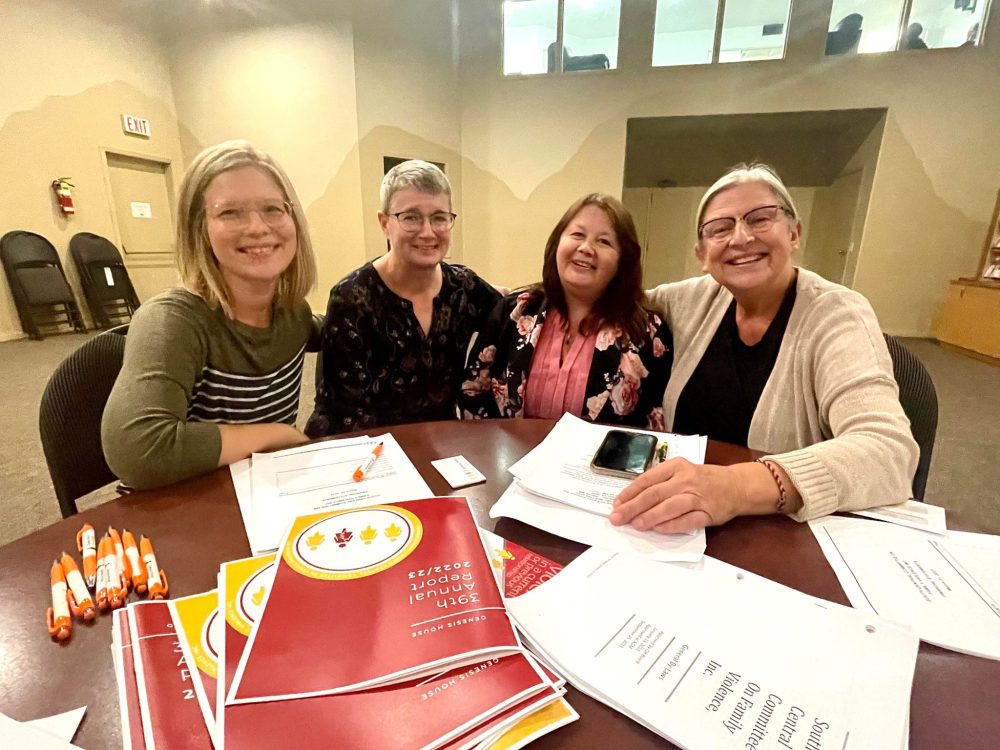Genesis House reflects on a year of growth and support
Advertisement
Hey there, time traveller!
This article was published 24/10/2023 (562 days ago), so information in it may no longer be current.
The South-Central Committee on Family Violence or Genesis House recently held its Annual General Meeting at The Exchange in Altona.
The meeting included feedback from Lisa Peters and Diana Wiebe of the CommUNITY Hub, which brings families and their supporters together to work through complicated life issues.
Genesis House Executive Director Angela Braun said it’s been another busy year at the shelter for abused women and their children, and local support organizations like these are vitally important to their work.
“We currently have more people than we have beds. But we do continue to have positive things happening, as well, with lots of good partnerships with community and local organizations such as Winkler Central Station, 500 Stephen Community Centre in Morden and The Community Exchange in Altona. Working together is more beneficial for each of us than working independently. We are literally creating a place where a person can’t slip through the cracks.”
Braun shared how Genesis House was recently turned down for a large grant to fund their new shelter project in Winkler.
“We hadn’t done this before. It was a national grant of $250 million to be distributed across Canada, for organizations that specifically support women and kids fleeing domestic violence. We worked very hard to get our application in, but there was lots of criteria. It took months to get it in and then months to hear back. It’s disappointing, but we still plan to continue with this project.”
Genesis House has already purchased the land for the new shelter, Braun said.
“It was already zoned for what we needed it to be. The question from the board was do we buy the land when we don’t have funding guaranteed for the project? We just jumped in and have faith that what we need will materialize.”
The new building will include 25 units.
“We’ll have a variety of suites. One of the challenges we have recognized is that we have a lot of single women that want to stay with the family until the kids are old enough to move out. And then they have no income and there’s no place for them to go. So, we have a number of one-bedroom units for that. We also have at least three three-bedroom units because we have some larger families who need a safe place to go.”
Braun said a number of the two-bedroom suites will be designated for reunification.
“We have more families than ever before, but we’re seeing less kids coming into the shelter. It’s not that the women don’t have kids, but so many of their kids are in care. So, we felt this could be a step towards reunification in a safe environment where there are programs and childcare and all the support required to safely reunite as a family. We’re looking at a two-year time frame for folks living with us and staying, but each situation will be unique.”
Moving from the shelter is the second stage for families coming out of a crisis.
“I imagine that’s where the majority of our clients will come from. And as the world evolves, and more housing is built, maybe a lot of our clients could rent a place, but there is nothing available now. The reality of front-line work is that our shelters are full of people, and more people are having a crisis and have nowhere to go. We try the best we can, but they can’t live in a hotel either.”
Braun says Genesis House still needs much more funding before they can break ground on the new project.
“The perfect situation would be applying for one large grant and getting it. At this point we’re looking at stacking grants, applying at multiple places. That process is new to me so I’m learning as I go. This is something that’s been in the works for a while, and we have enough to get the project to this point. We’re ready to build the foundation, and we can’t wait to get started.”

